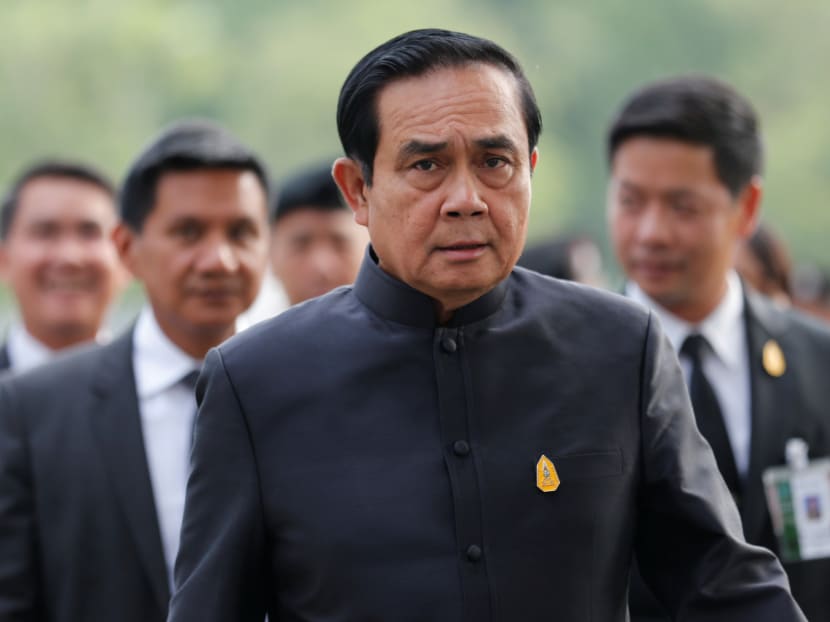Thai junta nears third year and settles in for longer stay
BANGKOK — Thailand’s ruling generals were supposed to quit within barely 18 months but they seem more firmly entrenched than ever as they prepare to celebrate the third anniversary of their May 2014 coup.
BANGKOK — Thailand’s ruling generals were supposed to quit within barely 18 months but they seem more firmly entrenched than ever as they prepare to celebrate the third anniversary of their May 2014 coup.
A country once among the more democratic in a mostly authoritarian region is now in its longest spell under hardline military rule for decades — and, as the junta flaunts a 20-year “reform” plan, it seems more and more like the new normal.
The Thai officers turned political masters of Southeast Asia’s second-largest economy have also been buoyed by a wider international swing towards autocracy. The latest vote of confidence in the junta’s staying power came in an invitation to the White House from President Donald Trump to Gen Prayuth Chan-ocha, the coup leader turned prime minister.
The May 22 anniversary of the putsch in Bangkok is one of a flurry of landmarks to the enduring power of military men who — either in or out of uniform — have ruled Thailand for much of the 85 years since the end of absolute monarchy. In May 1992, dozens of protesters were killed during a clampdown by the then military regime. In May 2010, scores more died as the army cracked down on demonstrators who had occupied part of a main Bangkok business district to protest against a civilian government installed with the generals’ backing.
Elections promised by the latest junta have been repeatedly delayed despite promises they would take place by the end of 2015. Polls will now not take place until after the end of the 12-month mourning for the death in October of King Bhumibol Adulyadej.
The main reason given initially for the hiatus was the rewriting of the country’s constitution, which was approved in a tightly-controlled referendum in August and then by new King Maha Vajiralongkorn last month. It is a measure of the kingdom’s unresolved internal political tensions that this is the 20th charter since 1932.
The generals have used this version to give themselves powers — long after they have formally stepped down — to choose MPs and even prime ministers. It is part of a two-decade master plan that is intended to be legally binding on future governments and covers areas ranging from the environment to civil service reform.
Most commentators are yet to be convinced this will either deliver good governance or revive a once humming export economy. The junta’s flagship “Thailand 4.0” proposals for growth offer few concrete ideas for dealing with problems such as an ageing population, increasing regional manufacturing competition and the gradual obsolescence of flagship products such as hard disc drives. Thailand’s economic growth may have ticked up to its highest quarterly rate for four years in the first three months of this year, but the country is still a regional laggard and has become increasingly dependent on tourism and government spending.
The sense of malaise has not yet materialised into a short-term threat to the authority of the generals, who have cracked down hard on their more severe critics. Scores of people have been charged under the country’s draconian lèse majesté and computer crime laws. Little is now heard from the established politicians who governed only a few years back. A sign of their weakness is that some of the most pointed criticism of Gen Prayuth lately has come from Netiwit Chotiphatphaisal, an outspoken 20-year-old student leader.
A more unpredictable dimension for the junta is the arrival of the new king and the next phase in the military-monarchy alliance that has long underpinned the power of both. The generals clashed with Facebook this week as they stepped up efforts to scrub the Thai internet of commentary and images that were potentially embarrassing to the monarch. But the king has also been flexing his muscles independently, bringing various royally-linked institutions under his direct control and securing late changes to the constitution that increase his authority.
The junta’s third birthday is unlikely to be greeted with much more than isolated protests by long-time critics. But neither will there be great joy in a country whose political and economic future looks no clearer than when the generals took power yet again three years ago. FINANCIAL TIMES







